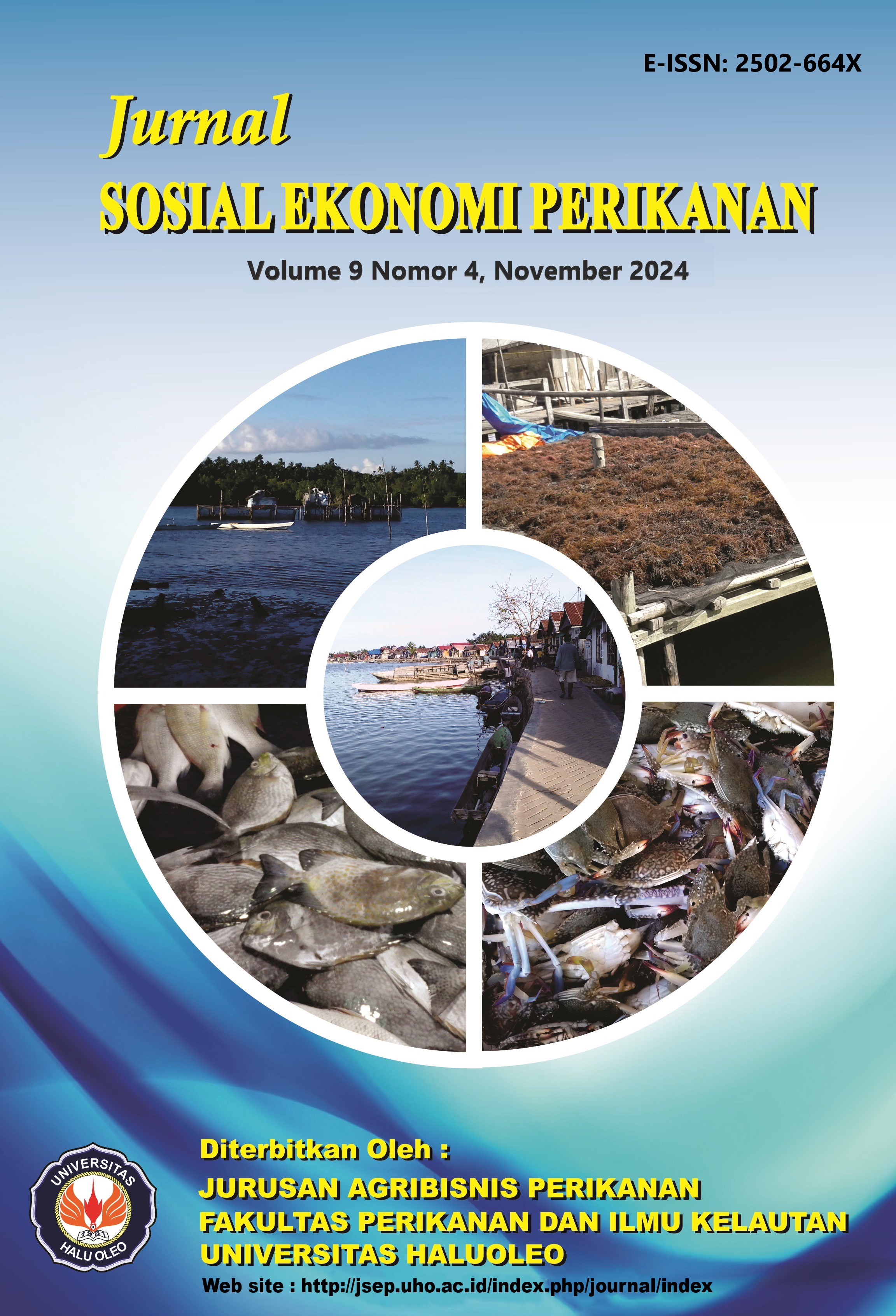Gender time allocation in family activities of Vaname Shrimp cultivators in Towua Village, Wundulako District, Kolaka Regency
DOI:
https://doi.org/10.33772/jsep.v9i4.113Keywords:
time allocation, gender, vaname shrimp, aquaculture businessAbstract
This study aims to determine the allocation of gender time in the households of fisherman cultivating vannamei shrimp ponds in Towua Village, Wundulako District, Kolaka Regency in productive, reproductive and social activities during the periode of November 20021. The population in this study, total 41 household. The sampling method was carried out using a simple random sampling technique, the number of samples selected was 14 vannamei shrimp farming households. Because this research is in a gender perspective, those who will be interviewed are men and women, in this case husbands and wives in every fishing household for vannamei shrimp ponds. Data obtained through observation, interviews and documentation. The data used are primary and secondary data. The method used is descriptive analysis using the Harvard Analitical Framework (HAF) in the households of fishermen culttivating vannamei didl shrimp pond, towua village wundulako subdistrict, it can be seen that there are real differences in the allocation of time used in the division of labor between husband and wife in produtive, reproductive and social activities for productive activities, husbands are more dominant than wives, husbands have working houurs of 5757.80 hours/3 monts with a percentage of 53.62%, while in reproductive and social activities wives have working hours of 1042.130 hours/3 months with a percentange 53.62% while in social activities the wife has worked 26.93 hours/3 months with an achievement of 1.39% method, by looking at how much income the fishing households cultivate in vaname shrimp ponds. The highest household income obtained from the cultivation of vaname shrimp ponds was Rp Rp67,200,000/cycle, the lowest was Rp67,200,000/ cycle and the average household income obtained was Rp25,856,933/ cycle.
References
Ariyanto, A., Sinaga, B. M., & Wahyuni, E. S. (2004). Alokasi Waktu Dan Ekonomi Rumahtangga Pekerja Pada Sektor Industri Formal Berdasarkan Gender. Disertasi Doktor. Program Pascasarjana, Institut Pertanian Bogor, Bogor.
Ely, Sitti Maryam. (2006). Analisis Keragaan Ekonomi Dalam Pespektif Pemberdayaan Perempuan Di Wilayah Pesisir Kabupaten Maluku Tengah.
Harahap, Mailina. (2016) Analisis Peran Gender Dalam Pemanfaatan Sumber Daya Perikanan Dan Laut. Studi Kasus Di Kecamatan Panai Hilir Kabupaten Labuhanbatu Provinsi Sumatera Utara.
Hubeis, A. V. S. (2010). Pemberdayaan Perempuan Dari Masa Ke Masa. cir.nii.ac.jp
Isamu, Imelda, Et Al. (2018) Analisis Kelayakan Usaha Budidaya Udang Vaname Pola Tradisional Plus Di Kecamatan Samaturu Kabupaten Kolaka. Jurnal Sosio Agribisnis (JSA) 3.1: 41-48.
Nurhasni, N., Antara, M., & Laapo, A. (2019). Analisis Pendapatan Usaha Tambak Udang Vannamei Di Desa Boyantongo Kecamatan Parigi Selatan Kabupaten Parigi Moutong. Agrotekbis: Jurnal Ilmu Pertanian (E-Journal), 7(1), 115-122.
Pranoto, Y. S. (2016). Pengaruh Input Terhadap Produksi Lada Putih (Muntok White Pepper) Di Desa Kundi Kecamatan Simpang Teritip Kabupaten Bangka Barat Provinsi Bangka Belitung.
Rosmawati, Rianda. L., & Taridala, AA (2016). Alokasi Waktu Jender Dalam Rumah Tangga Nelayan Budidaya Rumput Laut Di Kabupaten Buton Utara Sulawesi Tenggara. Jurnal Bisnis Perikanan FPIK UHO 3.1: 19-30.
Sundari, S. (2017). Pengaruh Lokasi Usaha Dan Jam Kerja Terhadap Tingkat Pendapatan Pedagang Dalam Perspektif Ekonomi Islam (Studi Pada Ikatan Pedagang Bandar Lampung) (Doctoral Dissertation, UIN Raden Intan Lampung).
Taridala, S. A. A., Hardiansyah, H., & Siregar, H. (2010). Analisis Peran Gender Dalam Pencapaian Ketahanan Pangan Rumah Tangga Petani Di Kabupaten Konawe Selatan, Provinsi Sulawesi Tenggara. In Forum Pascasarjana (Vol. 33, Pp. 263-274).
Downloads
Published
How to Cite
Issue
Section
License
Copyright (c) 2024 Yosan

This work is licensed under a Creative Commons Attribution 4.0 International License.
Jurnal Sosial Ekonomi Perikanan (JSEP) dilisensikan di bawah lisensi (CC Attribution 4.0). Pengguna bebas untuk menggubah, memperbaiki, dan membuat ciptaan turunan bukan untuk kepentingan komersial, dan walau mereka harus mencantumkan kredit kepada Anda dan tidak dapat memperoleh keuntungan komersial, mereka tidak harus melisensikan ciptaan turunan dengan syarat yang sama dengan ciptaan asli.





